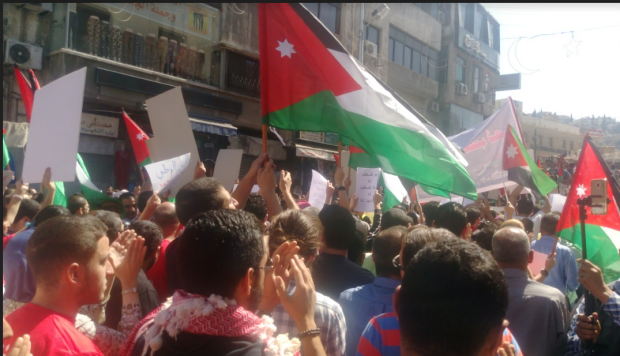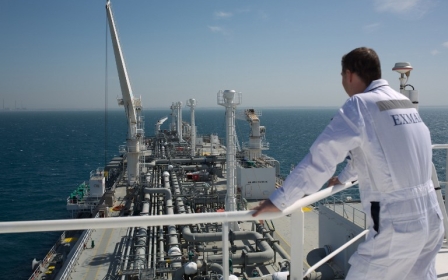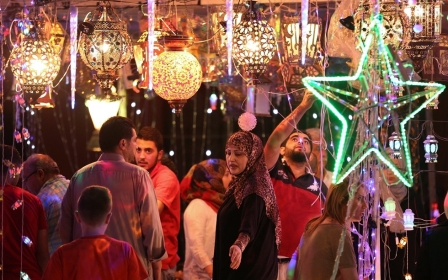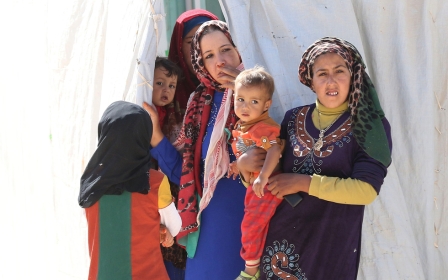Amman hit by protests over secret Jordan-Israel gas deal
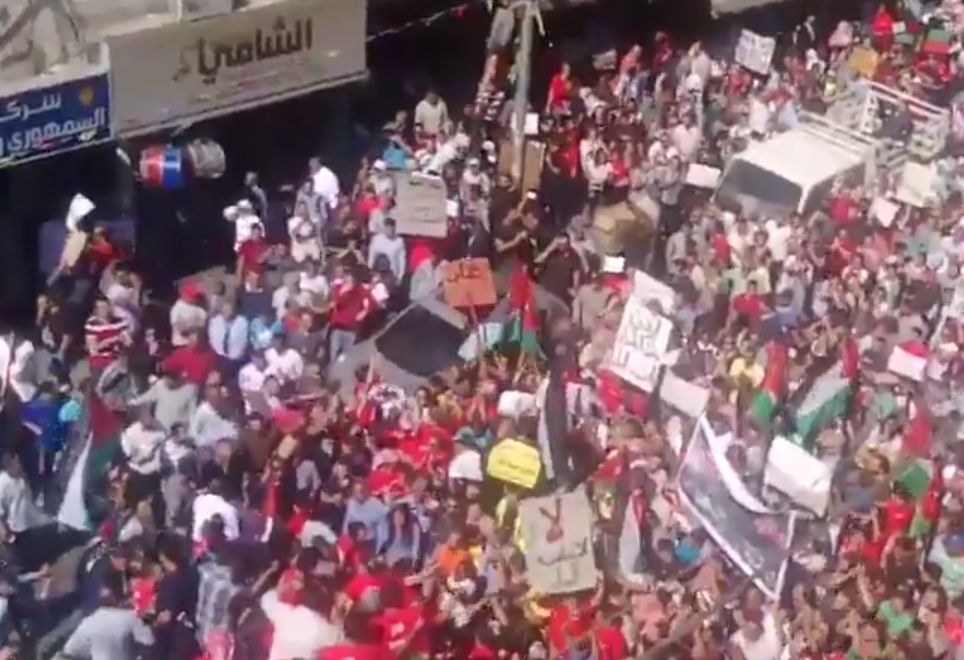
Thousands of protesters swamped the centre of Amman on Friday to demonstrate against the behind-closed-doors signing of an energy deal to bring Israeli gas into Jordan - a move condemned by opponents as a sop to the "Zionist entity" and against Jordanian interests.
Crowds chanted "Raise your voice in Amman" and "the people want national dignity" in protest at the government over the deal, in a demonstration titled "The enemy's gas is occupation".
An estimated 2,000 people took part in the peaceful demonstration, which was closed down by police after about half an hour.
The protest follows the signing this week of a deal to import natural gas from the Leviathan field off the coast of Israel between Jordanian National Electric Power Company (NEPCO) and the US-owned Noble Energy, which is a majority partner in extraction.
The "National Campaign to Overturn the Gas Deal with the Zionist Entity", a broad coalition of civil society groups, activists, lawyers and political groups, is stepping up efforts to protest the agreement despite its finalisation.
Aside from protests, the coalition has also convened a "people’s court" with the purpose of mobilising lawyers to protest the deal on a legal basis.
The group’s campaign slogan, "the enemy’s gas is occupation", has rapidly spread through Jordanian social media. At a protest outside the Ministry of Energy and Mineral Resources in Amman this Tuesday, Middle East Eye talked to Khaled, a member of the campaign and organiser of the demonstration.
“The government is blurring things out and hasn’t been straight since the beginning,” he said. “Its response is that there is no substitute for the gas - but there are many other sources.”
The campaign accuses the government of undemocratic practices. While parliament voted against the deal in December 2014, it was approved in the period before this month’s election when parliament was dissolved.
Members of the public were also not consulted on the matter, though a poll by Nabd al-Balad found that 90 percent of respondents rejected the deal.
We learned about the deal being signed through international media - Hisham Bustani, campaigner
Hisham Bustani, a member of the campaign and writer for 7iber, described the secrecy surrounding the deal to Middle East Eye. The campaign submitted a freedom of information request to see the agreement. The government responded saying that the deal is “secret”.
It has yet to make a public statement about the deal.
“We learned about the deal being signed through international media,” said Bustani. “The government prefers to be an agent for outside capital instead of developing the country and maintaining sovereignty.”
With the country flooded with US aid, Bustani pointed towards US pressure and government, as opposed to national, interests as reasons behind the deal.
“There is some sort of corruption going on,” he said, adding that the price of the Israeli gas is higher than market price - and higher than that which Jordan already imports from Shell to Aqaba.
A private matter
While NEPCO is technically a private company, it is wholly owned by the government.
Khaled, the protest organiser, said: "They state that because it is a private company they don't need to go through the government.
"There is a clause in the Jordanian law that states if the deal affects the Jordanian public or Jordanian sovereignty, it must go through judicial and parliamentary roots."
Jordanian MP Ahmad al-Armouti stated "the government does not have the right to sign any agreement contrary to the law or the constitution".
MPs from a variety of different political backgrounds have spoken out against the deal, saying that “normalisation is unacceptable in all its forms”.
The campaign estimates that 56 percent of the deal ($5.6bn) and an estimated 40 percent of electricity bills paid by Jordanian households will go directly into Israeli government coffers.
We refuse to be part of passing money to the occupation and killing our Palestinian brothers and sisters.
Rania, who joined Tuesday’s protest, said "the deal was signed to normalise Israel more in the region and to make us more dependent on Israel.”
Another protestor said signing "makes us a political ally of Israel... We refuse to be part of passing money to the occupation and killing our Palestinian brothers and sisters.
“This is a milestone and some may argue that it’s worse than Oslo or the peace agreement between Jordan and Israel,” commented Khaled. “The whole point of this deal... is enforcing normalisation so the thought of resistance, whether it’s peaceful, economic resistance… or cultural boycott is removed from the Jordanian individual’s mindset.”
Objectors note the disparity between how many Jordanians see Israel as an "enemy state" due to its occupation of Palestine, and the Jordanian government’s military, diplomatic and economic cooperation with Israel after the Wadi Araba agreement (1994).
Denying the right to resistance
The Boycott, Divestment and Sanctions (BDS) movement is prevalent in Jordan. BDS Jordan stated that the “agreement blatantly ignores the will of the Jordanian people”.
Khaled explained that while, before the deal, citizens were able to personally decide whether to "normalise" relations with Israel - by not buying imported fruits or vegetables, for example - now, “there is no choice. [The Jordanian citizen] is dependent. In this way, we feel it is a form of occupation”.
Opponents have highlighted the various alternatives, especially as gas already accounts for 85 percent of Jordan’s energy supply.
While the government predicts a growing demand of six to seven percent per year for energy production, currently the import of liquified natural gas to the Red Sea port of Aqaba sees a surplus which is re-exported to Iraq, Egypt and Jericho, West Bank.
Deals with Qatar (which has a larger supply than Israel) and Algeria for natural gas are also in the works, as is a planned pipeline from Basra, which would supply natural gas and oil to Jordan and Egypt.
Those seeking alternatives to Israeli gas, which the government claims will save it $600m per year, note Jordan’s native shale reserves, the fourth largest in the world, as well as opportunities within renewable energy.
An economic folly
Safaa’ al-Jayoussi, an environmental activist and head of the Climate and Energy Campaign, notes that “the gas deal is another example of the government putting money and efforts in the wrong place”.
“The Jordanian energy crisis is a crisis of ignorance. We have an energy sovereignty problem and instead of solving it by generating electricity from Jordan itself, we are moving from one country to another in order to import,” she explained.
The past year has seen a boom in Jordan’s green energy industry, financed by increasing international investment. Total investment in the sector is estimated at $1bn, with at least $532m going to the "Shams Maan" solar project.
Local green energy initiatives, such as the Hashemite University’s solar project, are not only touted by critics of the deal because of their environmentally friendly credentials. Investment in the native energy sector would aid Jordan’s chronic unemployment crisis, which overwhelmingly affects young people.
While the deal should supply 30 percent of Jordan’s energy needs, according to the government, it will not be implemented until 2019. Until then, Jordan’s energy needs will only expand. It seems opposition to the deal will also continue.
“I know the Jordanian government is not really democratic and does not listen to the people,” said Bustani, but through pursuing protest and legal action through the anti-corruption committee, he hopes that the “tremendous popular pressure around the country” will prevail.
New MEE newsletter: Jerusalem Dispatch
Sign up to get the latest insights and analysis on Israel-Palestine, alongside Turkey Unpacked and other MEE newsletters
Middle East Eye delivers independent and unrivalled coverage and analysis of the Middle East, North Africa and beyond. To learn more about republishing this content and the associated fees, please fill out this form. More about MEE can be found here.


